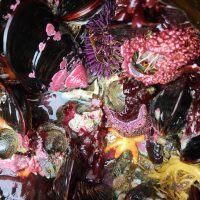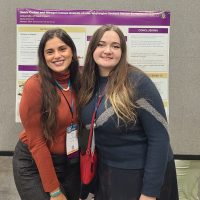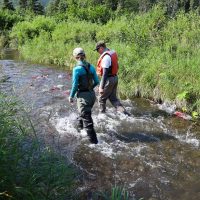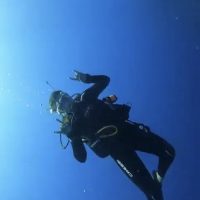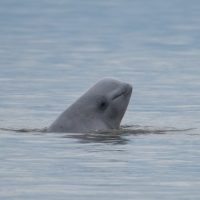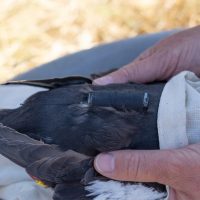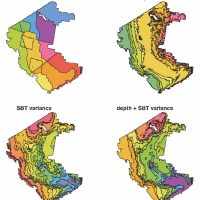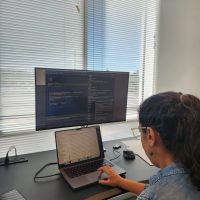Filter Results
SAFS Graduate Student Symposium Program now live!
From corals, birds and salmon to microplastics, otolith microchemistry and fisheries management, join us for a day full of grad research from around the world.
Read moreIntegrating mathematics with fishery science: another year of the Varanasi Internship
Now running for over a decade, the Varanasi Quantitative Undergraduate Summer Internship Program brings together math and fisheries sciences in a unique experience for students, who spend a summer working on research projects at NOAA Northwest Fisheries Science Center (NWFSC).
A collaborative program jointly funded by NOAA Fisheries, SAFS and the UW Department of Mathematics, and endowed by Usha and S.
Celebrating diversity in STEM and winning student awards at SACNAS 2023
The National Diversity in Stem Conference (NDiSTEM) organized by the Society for Advancement of Chicanos/Hispanics & Native Americans in Science (SACNAS) is the largest multidisciplinary and multicultural STEM diversity event in the U.S., serving to equip, empower, and energize participants for their academic and professional paths in STEM.
At the 2023 event held in October in Portland, SAFS graduate student, Nicole Doran, won the research presentation prize for Best Graduate Student Oral Presentation in the field of Ecology and Evolution, and recent Marine Biology graduate, Olivia Anderson, won a Native American/Indigenous Student Research Abstract Award.
Witnessing one of nature’s most impressive migrations: a summer with the Alaska Salmon Program
Nestled among a set of glacial lakes in the Wood River system is where scientists with the Alaska Salmon Program spend their summers. From students just beginning their research journeys in aquatic sciences, to seasoned field technicians and faculty, the camps based on Lake Aleknagik and Lake Nerka are the temporary home for both scientists and the fish that they are studying: Pacific salmon.
Read moreLooking to the past to inform the future
Historical ecology and data-limited fisheries stock assessment methods shed light on threatened Puget Sound Yelloweye Rockfish
By applying elements of historical ecology, fisheries science, and conservation biology in a highly collaborative research effort, researchers from the University of Washington School of Aquatic and Fishery Sciences (SAFS), NOAA Fisheries, and the Washington Department of Fish and Wildlife (WDFW) are delivering new insights into the status of Yelloweye Rockfish.
New SAFS MS student named Outstanding Graduate of Western Washington’s Marine and Coastal Sciences program
Named as the first Outstanding Graduate of Western Washington University’s Marine and Coastal Sciences program, Amirah Casey has recently joined the Applied Ecology Lab as an MS student, advised by Mark Scheuerell. Amirah shared with us what brought her to SAFS, plus what she is most excited about in this next step in her academic journey.
Watch the WWU video featuring Amirah
Throughout my undergraduate career I had received many encouragements that I should attend graduate school.
Why are some protected species failing to recover?
New study uses integrated population models to predict extinction risk for Cook Inlet beluga whales and lend insight into factors limiting the recovery of protected populations.
Sparse monitoring data and persistent knowledge gaps can hamper conservation efforts aimed at recovering depleted wildlife populations. In a new study, researchers from the UW School of Aquatic and Fishery Sciences (SAFS) set out to tackle this issue for federally endangered Cook Inlet beluga whales by developing an integrated population model that capitalizes on all available information to understand factors that may be affecting survival, reproduction, and population viability.
Bird backpacks: GPS tagging of rhinoceros auklets and pigeon guillemots on Protection Island
In an effort to establish a better understanding of the foraging habits of rhinoceros auklets and pigeon guillemots on Protection Island, Liam Pendleton’s seabird research has involved GPS tagging and monitoring of these seabird species to delineate key foraging locations in the waters surrounding the island. Rhinoceros auklets migrate all along the West Coast of the US and Canada, and nest on the same island as pigeon guillemots, featured in a previous article by SAFS.
Read moreAdapting monitoring to a changing seascape: efficiency, flexibility and continuity for bottom trawl surveys
Fishery-independent survey data represents essential information for stock assessment, ecosystem-based fishery management initiatives, and applied ecological research. These data refers to information collected over space and time about populations of marine organisms, such as population abundance and biomass. The data can be used to fit statistical models to obtain multiple products for the assessment and management of marine populations. and can provide a comprehensive and standardized picture of marine populations when collected consistently over time, particularly with respect to gear selectivity and sampling design.
Read moreAdvancing eDNA methods to inform ecological and conservation questions
The use of eDNA methods is a new and exciting area of research. Tania Valdivia, a post-doctoral student in the Whale and Dolphin Ecology Lab, is working on a large marine project under the guidance of Amy Van Cise from SAFS, and Ryan Kelly from the School of Marine and Environmental Affairs (SMEA).
The project focuses on the application of eDNA methods to detect and identify the spatial distribution of marine mammals and their prey in the California Current.
